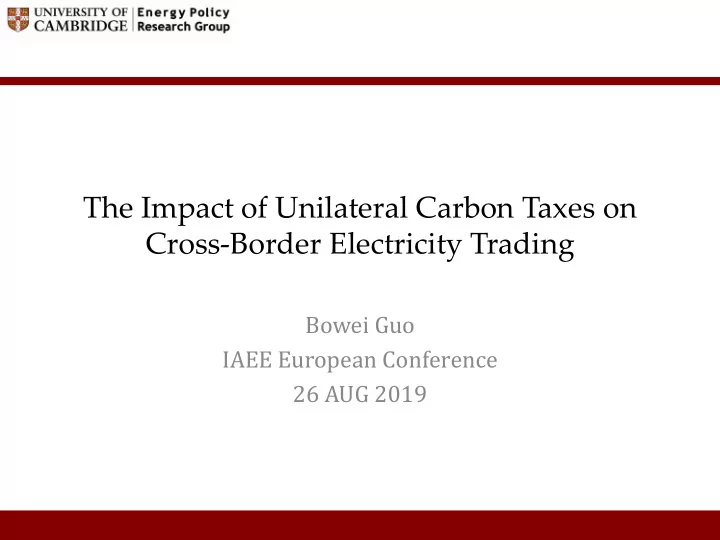

The Impact of Unilateral Carbon Taxes on Cross-Border Electricity Trading Bowei Guo IAEE European Conference 26 AUG 2019
Outline • The UK government introduced a Carbon Price Floor (CPF) from 2013. – On top of the EU ETS – Raised twice until 2016, then stablised at £18/tCO2. • Interconnectors create value: the higher price market imports cheaper electricity from its neighbours. – Market coupling ensures higher-price markets to import (in the day-ahead market). • Questions: What is the impact of CPF – on energy prices, net import, private and social value... under market coupling? www.eprg.group.cam.ac.uk 2
Evolution of the EUA Price and CPF, £/tCO2 CPF=CPS+EU ETS • By April 2013, the EUA price fell to under £4/tCO2 . • The CPF was intended to bring the carbon costs to £(2011)30/tCO2 by 2020 • and £(2011)70/tCO2 by 2030. In November 2017 the EU reformed the ETS, introducing a Market Stability • Reserve. www.eprg.group.cam.ac.uk 3
Market Coupling Starting from 4 February 2014, electricity market coupling in North • Western Europe went live; Great Britain, France, and the Netherlands took part in this initiative, • while on the island of Ireland the SEM was not integrated until 1 October 2018. Day-ahead scheduled commercial exchange of IFA flows v.s. GB-FR • price differentials, before and after market coupling: www.eprg.group.cam.ac.uk 4
28-day lagged Moving Average wholesale prices, 2013-2017 While GB prices are typically higher than NL prices, the CPS widens • the GB-NL price differential; FR prices are much more volatile: 80% (in 2015) of electricity comes • from nuclear, resulting in less flexible electricity system. www.eprg.group.cam.ac.uk 5
The impact of unilateral carbon taxes on trade The CPS raises GB prices, resulting in higher imports; • GB generation costs falls, FR cost rises, deadweight loss incurs; • The total increase in cost is HEG. • www.eprg.group.cam.ac.uk 6
Estimation process • Estimate the impact of interconnector flows and the CPS on the IFA and BritNed price differentials; • Three-stage process: – estimate price differentials without the CPS holding flows at their original value; – re-couple the interconnector markets, with any changes in flows further influencing the price differentials; – evaluate the impact of the CPS on net imports, congestion income, the carbon cost pass-through to the cross-border market, and deadweight loss. www.eprg.group.cam.ac.uk 7
Results: short-run effects As GB imports more, 𝑂𝑈𝐷 reduces 𝑄𝐸 , • GB less carbon intensive, 𝑊𝐷 𝐷𝑃𝐵𝑀 negatively impacts 𝑄𝐸 , 𝑊𝐷 𝐷𝐷𝐻𝑈 • positive, EUA negative. 𝐷𝑄𝑇 have positive impact on 𝑄𝐸 . • www.eprg.group.cam.ac.uk 10
Results: long-run effects • On the 23 June 2016, the GBP/EUR exchange rate fell from 1.30 to 1.17, reduced the GB CPS by €2.34/tCO2. • In the long run, the Brexit referendum reduced the GB-FR(NL) price differential by €1.42 (1.08)/MWh . www.eprg.group.cam.ac.uk 11
CPS pass through to the GB day-ahead prices • The CPS pass-through to the GB DAM price: the ratio between the increase in the DAM price and the increase in the system marginal cost (SMC). • Chyong et al. (2019): a €1/MWh increase in the CPS on average increases the SMC by €0.374/MWh. • The SR CPS pass-through rate is 60% from IFA estimates (or 58% from BritNed estimates) with a 95% confidence interval of 35-85% (IFA) or 35-80% (BritNed). • The LR CPS pass-through rate from the IFA estimate is 163% (s.e.=31%) and from the BritNed estimate is 124% (s.e.=21%) – Differences not statistically significant from each other nor from 100% pass-through (at 1% significance level). – Consistent with a lagged adjustment to full pass-through and a workably competitive GB day-ahead market. www.eprg.group.cam.ac.uk 12
Results summarise: over 2015-2018 the £18/tCO2 of CPS would have raised the GB day-ahead price by an • average of about €10.5/MWh in the absence of compensating adjustments through increased imports. The actual price differential with our neighbours fell to about • €8.5/MWh after allowing for replacement by cheaper imports. The CPS increased GB imports by 13.6TWh/yr, thereby reducing • carbon tax revenue by €113m/yr . The commercial value of interconnectors increased by €133m/ yr, half • to foreign interconnector owners. Infra-marginal surplus valued at around €25m/ yr, but the CPS created • deadweight losses of €30 m/yr . About €2.2/MWh (18%) of the increase in the GB price caused by the • CPS was passed through to higher French prices and €2.6/ MWh (29%) to higher Dutch prices. www.eprg.group.cam.ac.uk 15
Conclusion • The British CPS raised the GB spot price, reduced the convergence of cross-border electricity prices and increased GB imports of electricity. • The increase in congestion income (mostly) comes from GB electricity consumers but is equally allocated to both TSOs, over-incentivising further investment in interconnectors. • Due to higher import, both French and Dutch day-ahead prices have been slightly increased. • GB imports more from more carbon-intensive countries (potentially carbon leakage). • Asymmetric carbon pricing in two connected countries incur deadweight losses, resulting in less efficient cross- border trading. • Other countries should introduce CPF. www.eprg.group.cam.ac.uk 16
Recommend
More recommend